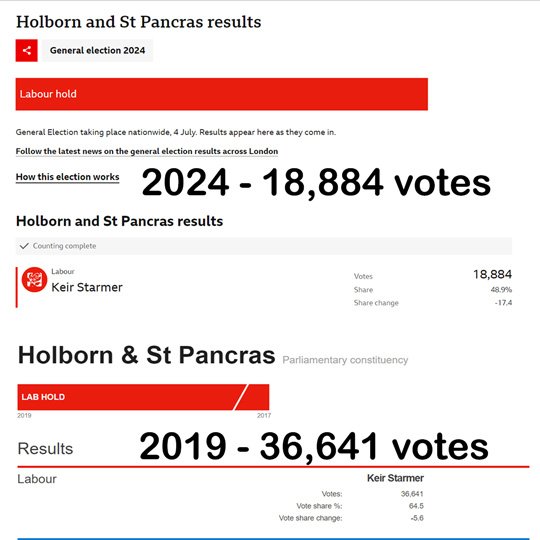Numbers Don’t Lie: The Democratic Deficit in British Politics
As the dust settles on this electoral battlefield, we find ourselves knee-deep in the deluge of statistics, percentages, and vote shares. It’s a numbers game, dear reader, and one that paints a picture more complex and troubling than the mainstream media would have you believe.
The political classes and their media courtiers are frantically shuffling figures, desperately trying to paint a picture that suits their narrative. But as George Orwell so aptly put it, “In a time of deceit, telling the truth is a revolutionary act.” So let us engage in a bit of revolution even if it’s just in the satisfaction of knowing the truth.
The most glaring omission from this numerical waltz is the embarrassing fact that Sir Keir Starmer, our newly coronated Prime Minister, saw his own constituency vote of Holban and St Pancras plummet from a robust 36,641 in 2019 by half to a mere 18,884 in 2024. You might think this would give pause to those hailing Starmer as the nation’s saviour, but alas, cognitive dissonance seems to be the order of the day.
Maybe it’s because we find ourselves in a peculiar predicament as the country breaths a collective sigh of relief at the departure of the Tory kleptocracy, but let’s not kid ourselves about what we’re getting in return. We’ve traded one group of self-entitled, thieving bastards for a narcissistic, self-opinionated globalist, readying us for the Trilateralist’s grand design. Out of the frying pan and into the fire, as they say.

The Numbers Game: A Post-Election Autopsy
Just as in Sir Keir’s home constituency, where his own vote share plummeted embarrassingly, the national numbers tell a tale not of Labour’s triumph, but of a party stumbling into power amidst the wreckage of a conservative implosion. This was no resounding victory for Starmer’s vision, but rather a reluctant coronation by a deeply fractured nation. Labour didn’t win the people over; they merely stood by as the beneficiaries of the Tory Party’s spectacular self-immolation and the mauling Reform inflicted upon the conservative vote.
The figures paint a stark picture of this political landscape. Labour’s vote share inched up by a mere two points, from 32% to 34% – hardly the surge one might expect from a party poised to ‘save’ the nation. Meanwhile, the Conservatives witnessed their support plummet by a staggering 20 points to 24%. Perhaps most telling is the fate of the Reform Party, which, despite capturing 14% of the vote, secured only five seats – like them or lump them, it’s a damning indictment of the grotesque distortions inherent in our electoral system.
Starmer 2024 33.8% of vote = 412 seats. Majority 168.
CORBYN WON MORE VOTES IN 2019 THAN STARMER in 2024 > 10.2m v 9.7m
Of course, it’s first past the post that counts!!!
What’s more, this disparity between votes and seats has reached historic proportions. Labour, with just 34% of the vote, has secured a staggering 64% of parliamentary seats. It’s a result that makes a mockery of democratic representation and has prompted renewed calls for electoral reform – calls that will undoubtedly fall on deaf ears now that Labour finds itself the beneficiary of this systemic injustice.
This is less a Labour victory than a Conservative death rattle, a terminally ill party finally exorcised from government. As George Orwell astutely observed, “In our age there is no such thing as ‘keeping out of politics.’ All issues are political issues. and politics itself is a mass of lies, evasions, folly, hatred and schizophrenia.” And indeed, this election has proven we suffer it all. That even political suicide is a form of politics – one that the Tories have mastered with alarming proficiency.
The irony of this situation would be comical if it weren’t so perilous for our democracy. We find ourselves with a government wielding a supermajority on the back of a minority of votes, led by a man whose own constituents have drastically reduced their support for him. It’s a victory built not on the solid ground of popular mandate, but on the quicksand of a broken system and a fractured opposition.
Votes vs. Seats: The Stark Reality of Britain’s Electoral System
But here’s where it gets truly interesting. Reform UK, Farage’s latest political vehicle, has captured 14% of the vote but a mere 1% of seats. It’s a disparity so stark it makes a mockery of our electoral system. The Greens fare little better, with 7% of votes translating to just 1% of seats.
Sir Ed Davey’s Party, those inbetweeners, The Lib Dems won 12% of total votes cast and 11% of seats in Parliament. That’s 72 bums on benches making them Britain’s third biggest Party.
This democratic deficit has prompted renewed calls for electoral reform, with even Richard Tice of Reform UK decrying the “injustice” of millions of votes resulting in a handful of seats. The Electoral Reform Society has gone so far as to label this “the most disproportional [election] in British electoral history”.
Starmer, who once waxed lyrical about the need to address the fact that “millions of people vote in safe seats and they feel their voice doesn’t count,” has now conveniently developed a “long-standing view against proportional representation”.
It seems principles are as disposable as campaign promises in the New Labour regime, but for all those that have been paying attention nothing in this is new, Starmer’s journey to No10 has been one of shedding promises and pledges along the roadside.
What we’re left with is a deeply divided Britain, ruled by a government with a supermajority but ironically little popular support. Starmer may preach unity and service, but as a member of the Trilateral Commission, active or not, his priority is not service to the country, but readying the UK for further integration into the globalist agenda: bringing us into lockstep with the EU. After all, as a Trilateralist member, hasn’t that always been the plan?
So here we are, dear readers, at the dawn of a new political era. We’ve exchanged one flavour of autocracy for another, all while the voices of millions go unheard. Democracy, it seems, is as malleable as Starmer’s principles.
In the end, we’re reminded of Orwell’s prescient warning: “The Party seeks power entirely for its own sake. We are not interested in the good of others; we are interested solely in power.” As we embark on this new chapter of British politics, we would do well to keep these words in mind. The numbers don’t lie, but those who interpret them for us most certainly do.
Support Independent Journalism Today
Our unwavering dedication is to provide you with unbiased news, diverse perspectives, and insightful opinions. We're on a mission to ensure that those in positions of power are held accountable for their actions, but we can't do it alone. Labour Heartlands is primarily funded by me, Paul Knaggs, and by the generous contributions of readers like you. Your donations keep us going and help us uphold the principles of independent journalism. Join us in our quest for truth, transparency, and accountability – donate today and be a part of our mission!
Like everyone else, we're facing challenges, and we need your help to stay online and continue providing crucial journalism. Every contribution, no matter how small, goes a long way in helping us thrive. By becoming one of our donors, you become a vital part of our mission to uncover the truth and uphold the values of democracy.
While we maintain our independence from political affiliations, we stand united against corruption, injustice, and the erosion of free speech, truth, and democracy. We believe in the power of accurate information in a democracy, and we consider facts non-negotiable.
Your support, no matter the amount, can make a significant impact. Together, we can make a difference and continue our journey toward a more informed and just society.
Thank you for supporting Labour Heartlands












